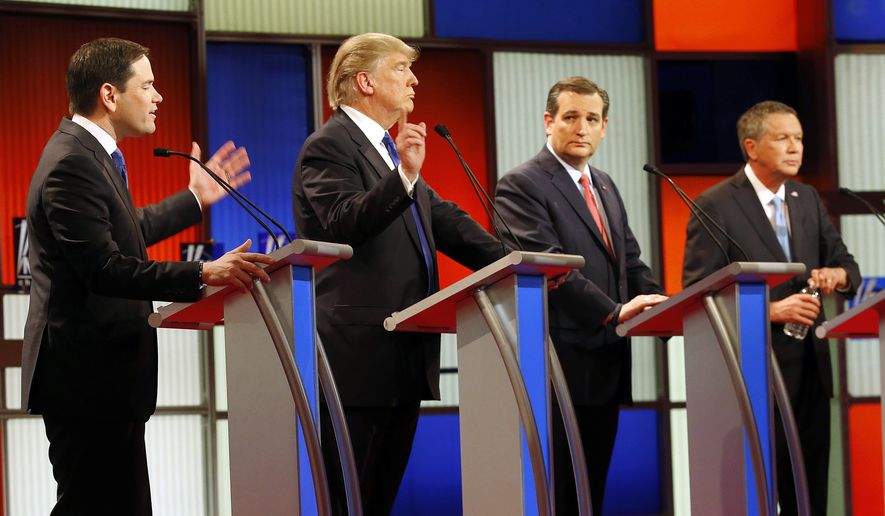After the weekend’s contests, the race for the GOP nomination for president has clearly come down to a two-man race between Donald Trump and Ted Cruz. Neither Marco Rubio nor John Kasich has a chance to win the 1,237 delegates needed to arrive at the Cleveland convention with the delegate majority necessary to claim the nomination. Accordingly, they should both drop out now and let Mr. Trump and Mr. Cruz face off in the final stretch of contests - or else assume the responsibility of allowing Mr. Trump to be nominated.
If they don’t drop out immediately, the likelihood is great that the man both Mr. Kasich and Mr. Rubio say they want to stop - Mr. Trump - will emerge from the California and New Jersey primaries in early June with more delegates than anyone else.
And if Mr. Trump arrives at Cleveland in July with more delegates than any other candidate, it matters not whether he has the outright majority of 1,237 needed, or a simple plurality. Either way, he will emerge as the GOP nominee, or there will be rendering of garments and gnashing of teeth among the Trump partisans, who then will be tempted (baited on, no doubt, by regular tweets using words like “cheated!” and “unfair!” from Mr. Trump) to sit out the general election, leading to a virtually guaranteed four more years of a liberal Democrat in the White House.
The clock is ticking. And every moment that goes by without both of them announcing their withdrawal is a moment we draw nearer to a Trump nomination.
After the weekend’s contests - in which Mr. Cruz stunned Mr. Trump in both Kansas (where Mr. Trump had the endorsement of Secretary of State Kris Kobach) and Maine (where Mr. Trump had the endorsement of Gov. Paul LePage,), and tied Mr. Trump for delegates won in Louisiana - Mr. Cruz is just 84 delegates behind Mr. Trump in the all-important delegate count.
Mr. Rubio? He trails Mr. Trump by 233 delegates. Mr. Kasich? He’s 347 delegates behind.
In other words, even were they both to capture their home states on Tuesday, March 15, it wouldn’t do either of them enough good to put them back in the hunt. Oh, it would help slow down Mr. Trump’s climb to the top, certainly, but it wouldn’t do anything to truly change the arc of the race.
That’s where the Louisiana experience is instructive.
Going into Saturday’s balloting, Mr. Trump had every reason to feel good about the Pelican State. The three most recent public polls - from the Trafalgar Group (fielded four days before the Saturday election), the University of New Orleans (fielded three days before the Saturday election), and Gravis Marketing (fielded two days before the Saturday election) - showed Mr. Trump leads over Mr. Cruz of 18 points, 12 points, and 17 points, respectively.
None of them captured the aftermath of Thursday evening’s debate, or the anti-Trump messaging that followed in the news on Friday or Saturday morning, or the value added by Mr. Cruz’s organization in the state.
Mr. Trump won the early and absentee ballots cast in the Louisiana primary - the great majority of which were cast before last Thursday’s debate, before opposition to Mr. Trump at the annual Conservative Political Action Conference gathered steam, and before the anti-Trump air campaign waged by Club for Growth, Our Principles PAC, and the American Future Fund had really begun.
By contrast, Mr. Cruz overwhelmingly won the ballots cast on Saturday in Louisiana, by which time the full anti-Trump messaging campaign had had time to sink in.
In the end, Mr. Trump eked out a 41 percent to 38 percent win, a far cry from the 17-point lead he had in the last public poll before the election. As mentioned above, Mr. Trump’s “victory” over Mr. Cruz was so weak that he won precisely zero delegates more from Louisiana than Mr. Cruz.
In other words, Louisiana shows that the anti-Trump campaign can have a dramatic effect.
A review of the 21 contests conducted to date shows that in only two states - Massachusetts and Alabama - did Mr. Trump crack the 40 percent threshold. Clearly, despite his protestations to the contrary, there is a Trump ceiling. There are more anti-Trump votes to be found in upcoming primaries and caucuses than there are pro-Trump votes. The way to defeat Mr. Trump, therefore, is to roll all the anti-Trump votes behind just one candidate, rather than splitting them three ways.
So, instead of Mr. Rubio playing for Florida (and splitting the anti-Trump vote there) and Mr. Kasich playing for Ohio (and splitting the anti-Trump vote there), imagine instead a scenario where Mr. Rubio drops out and endorses Mr. Cruz before Florida, and Mr. Kasich drops out and endorses Mr. Cruz before Ohio, and they both urge all their supporters to vote for Mr. Cruz instead. Based on what we saw in Louisiana, it could well be the case that Mr. Cruz could best Mr. Trump in Florida and Ohio.
Were Mr. Cruz to win both Ohio and Florida - or either one of them, for that matter - the narrative of the campaign would change overnight, and everyone would know Mr. Trump can be blocked.
But will Mr. Kasich and Mr. Rubio make the sacrifice for the good of the movement they claim to revere, the party to which they are bound, and the nation they claim to love? Time will tell.




Please read our comment policy before commenting.